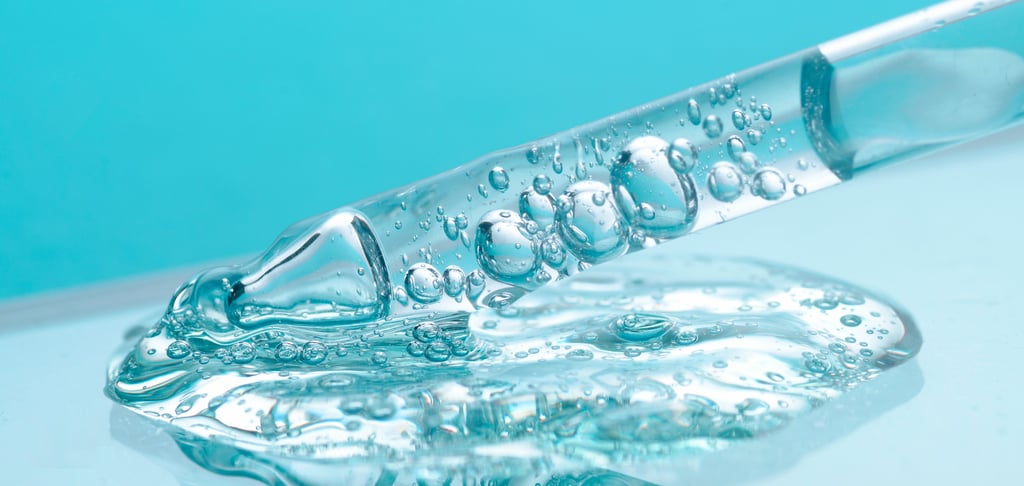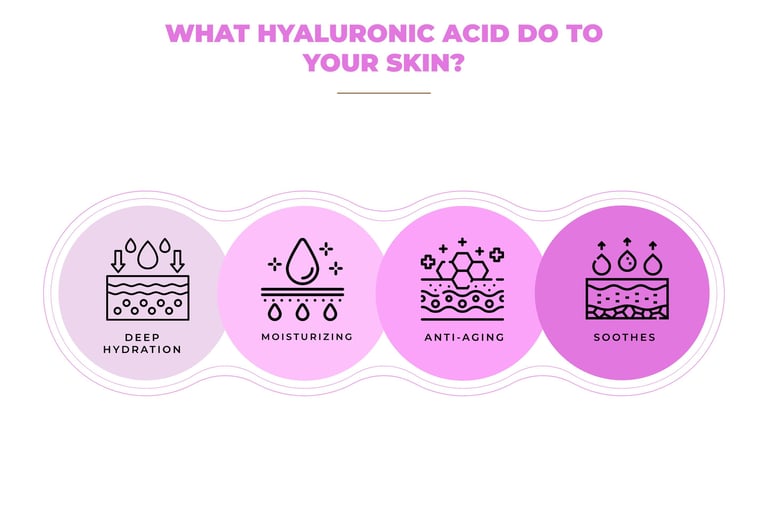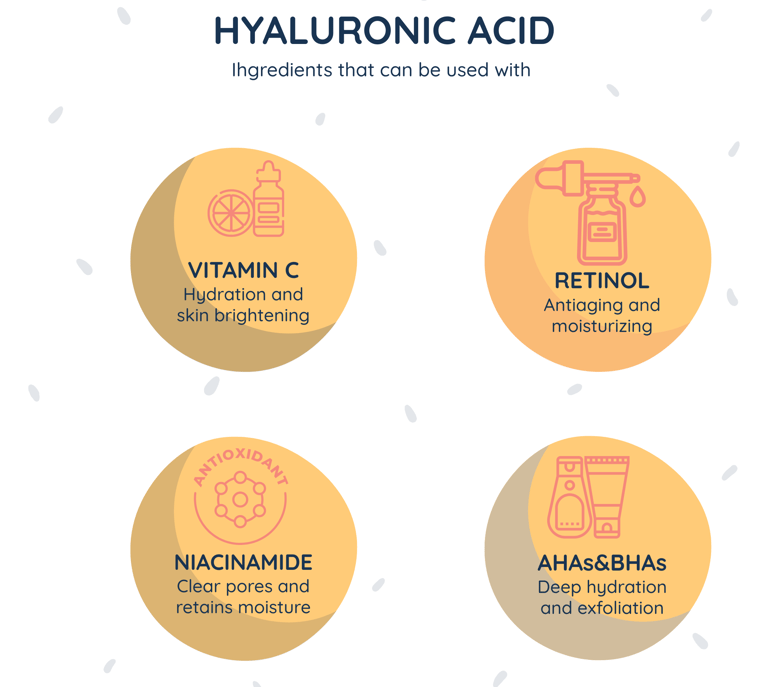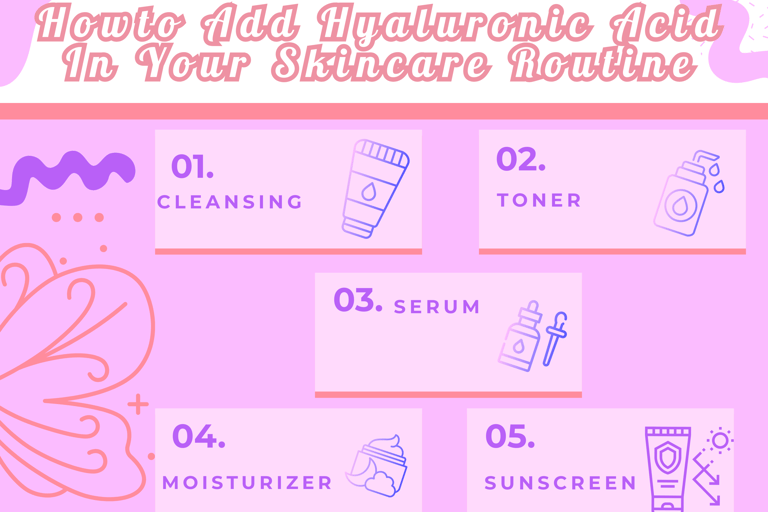Hyaluronic Acid for Skin: Benefits, Tips, Secrets and All-in-Between!
SKINCARE INGREDIENTS


Overview
In recent years, hyaluronic acid has gained popularity in skincare space, promising youthful, well-hydrated, dewy skin to whoever uses it. Hyaluronic acid is a natural polysaccharide, non-sulfated, glycosaminoglycan that is found in human connective tissues such as
cartilage,
whites of the eyes
synovial joints and skin
The term hyaluronic 'acid' should not be confused for other skincare actives that act as exfoliants, the likes of glycolic acid, lactic acid, mandelic acid or poly hydroxyl acids (PHAs). Instead 'acid' just implies that hyaluronic acid has lower pH, not harsh or exfoliating that's it.
Roughly 50% of body's hyaluronic acid is found in skin. As pointed out, hyaluronic acid (HA) is produced within cells by enzyme known as hyaluronic acid synthases (HAS). One should know, there are several types of hyaluronic acid degraders too found in the body playing different roles in different body parts such as
As we age, we slowly lose this important molecule in the skin together with collagen. Remember hyaluronic acid in the skin layers is what gives the skin that supple, voluminous and plump feel. The loss of hyaluronic acid can be blamed majorly by photoaging that contributes to up to 80% of all signs of aging affecting the skin.
So, where does hyaluronic acid come from? The hyaluronic acid you get from skincare products come from combs from roosters, shark skin as well as some type of bacteria. Though plants sources of hyaluronic acid are available too.
DID YOU KNOW?
An average adult human body uses roughly 5 grams of hyaluronic acid.
Hyaluronic acid is a hydrophilic(water-loving) substance that can hold up to 1000 times its weight in water. One demonstration showed that 1 gram of hyaluronic acid can hold up to 6 liters of water.
Tanzanite Skincare
Table of Contents
1.0 Overview
1.1 Fun Facts
2.0 Hyaluronic Acid in Skincare
3.0 Benefits of Hyaluronic Acid for Skin
4.0 Side Effects of Using Hyaluronic Acid
5.0 Forms/Types of Hyaluronic Acid
6.0 Are Hyaluronic Acid Fillers Safe?
7.0 Should I Take Hyaluronic Acid Powder?
8.0 Hyaluronic Acid Molecular Size
9.0 Hyaluronic Acid and Skin Types
10.0 Hyaluronic Acid with other Skincare Ingredients
11.0 How to Use Hyaluronic Acid Serum or Moisturizer in Skincare Routine
12.0 Frequently Asked Questions
13.0 Refences
Hyaluronic Acid In Skincare
Despite hyaluronic acid being found in the skin, still our cosmetic chemists thought it'll be good idea to make for us hyaluronic acid moisturizers, lotions, serums, creams and OTC (over-the-counter) ointments. Because you'll lose more hyaluronic acid than produce as you age. HA can be a life saver for anyone who wants to have well-moisturized, supple, dewy and smooth skin with little to no side effects.
Hyaluronic acid (HA) can help replenish and retain water in the skin. Both topical and orally taken HA powders can support skin health. You can also simply make your own DIY serum with hyaluronic acid powder and distilled water.
Another thing is that hyaluronic acid is actually a very gentle skincare ingredient that can be incorporated with most of the skincare ingredients that are already found in the skincare scene without causing skin allergies or worsen skin conditions.
Benefits of Hyaluronic Acid for Skin
After a few outlines and insights, you may want to know more about HA and how it can benefit your skin health. You can easily add it in your skincare regimen without overthinking too much. It can be used at any part of the day, morning or evening routine. Let's see benefits you can get from HA as follows:
Moisturizes the Skin
Reduces Fine Lines and Wrinkles
Promotes Skin Rejuvenation and Healing
Prevents Transdermal Water Loss
Improves Skin Texture
Reduces Signs of Aging
Soothes and Calms Dry Skin
Tanzanite Skincare
1. Moisturizes the Skin
Hyaluronic acid or let's call it hyaluronan, is an excellent humectant available in skincare. This ingredient can help to seal in moisture by acting like a protective film that doesn't allow water or other water-based ingredients such as niacinamide and vitamin C to evaporate easily and leave your skin feeling dry.
Another good thing thing is that hyaluronic acid is that it can be easily formulated with water-based cosmetic formulas such as gels, creams, serums and moisturizers.
Several studies have shown that hyaluronic acid (HA) can boost moisture in the skin upper layer. For moisturization higher molecular weight hyaluronic acid can do a great job at locking in water in skin's epidermis.
2. Reduce Fine Lines and Wrinkles
Another advantage of using hyaluronic acid(HA) is unravelling deep furrows, lines and wrinkles on your skin. You see, as you get older your skin loses its natural hyaluronic acid which manifests as wrinkles.
You'll see this in young babies having soft and supple skin but from teenage onwards we lose our HA till there's no more in the upper skin layer at old age. To avoid this using cosmetic formulations with hyaluronic acid is the answer.
Here you'll need skincare products with smaller molecular weight hyaluronic acid that can penetrate deeper in skin layers. Some research study found out hyaluronic injectables could really help with smoothening out deep lines and wrinkles but also add lost volume in the skin.
For this kind of procedures, you need to talk with your dermatologist or doctor to see if you're a right candidate. There are many brands out there though Juvederm® is very popular option.
3. Promotes Skin Rejuvenation and Healing
Some skin types due to being delicate, are more prone to blemishes, micro cuts that can lead to scars. It has been found out that high molecular weight hyaluronic acid (HMW-HA) can help to heal scars that appear on skin.
It also has anti-inflammatory properties that can calm and soothe the skin. HA has potentials in helping the skin to restore and revitalize skin cells. Additionally, hyaluronic acid can support skin function making it have more youthful appearance.
Hyaluronic acid can support skin rejuvenation due to their anti-aging properties that can boost skin elasticity and collagen production stimulation that can cover blemishes, repair and fasten recovery of broken skin. Using hyaluronic acid-containing skincare products can improve blemish-prone skin.
4. Prevents Transdermal Water Loss
For those with dry skin or dehydrated skin, fighting flaking or dryness in the skin is a constant battle. Adding hyaluronic acid in your skincare regimen can improve skin barrier integrity and hydration.
Though there are some skepticism on how hyaluronic acid functions in bringing hydration to skin. Here are some few research studies, one research study hyaluronic acid was compare with other cosmetic active ingredients such as glycerin, urea and sericin, TEWL can be reduced significantly with more anti-aging benefits than the latter.
Though it should be noted hyaluronic acid works best in emulsions than other topical formulations such as gels as proven in studies. When pair with occlusive ingredient it can be even more effective than itself in retaining water in the stratum corneum.
Lower molecular weight hyaluronic acid can also penetrate deeper than higher molecular weight one which just forms a layer on the skin.
5. Improves Skin Texture
If you already know one of the things that hyaluronic acid is to plump up the skin. In the process it can smoothen out the lines on the forehead and nasolabial lines in the face.
For more drastic improvement and supple feel, hyaluronic acid fillers are used in the face to add lost volume due to aging but also this can lead to smooth and radiant skin as a result of using HA fillers.
Here is what skincare expert, Dr. Davin Lim had to say about hyaluronic acid in one of his videos, "..hyaluronic acid actually helped all three top part texture, tone and most importantly volume so that is a powerful anti-aging tool and if used correctly all the little three aspects, it can give you really good skin rejuvenation.."
One study found out that hyaluronic acid serum and peptide-rich cream when applied on face and neck. It showed improvements in skin texture by 79% in 12 weeks, which can be significant results since you can rarely observe skin improvements overnight.
6. Reduces Signs of Aging
In skincare active ingredients, hyaluronic acid cannot be left out in a consistent skincare regimen especially when you hit your mid to late 20s and beyond. As pointed out before, there are many numerous benefits from using hyaluronic acid.
Hyaluronic acid has anti-aging and antioxidant properties that can improve skin youthfulness and plump. Hyaluronic acid can be easily used with other skincare active ingredients like retinol, vitamin E, C and B5, ceramides and more without having skin irritation or inflammation.
Studies have found HA topical formulations can enhance skin rejuvenation, cell renewal and turnover.
7. Soothes and Calms Dry Skin
There are many HA skincare products such as creams, lotions, ointments and serums that promise skin hydration. Another thing that make hyaluronic acid attractive is its anti-inflammatory properties.
If you have sensitive, delicate, blemish-prone and dry skin or have skin conditions then hyaluronic acid is very gentle and can soothe as well as hydrate the skin. This is what makes hyaluronic so popular in the skincare industry. Not too harsh, just right for any skin types with little to minimum side effects.
If you face allergic reactions, then are more likely caused by other ingredients or preservatives found in the skincare formulations. Always do a patch test before adding hyaluronic acid in your routine despite it being well-tolerated ingredient especially for sensitive skin type.
But also hyaluronic acid is used in eye drops to soothe strained and dry eyes apart from soothing the skin.


Side Effects of Using Hyaluronic Acid
The risks of using hyaluronic acid can depend on various things such as mode of delivery, form of hyaluronic acid, underlying skin issues, and where it gets applied.
Mode of delivery: If hyaluronic acid is injected under the skin, it can lead to bruising, pain, irritation and even swelling in some situation. If you want to get HA fillers then it is always good idea to talk to a professional and discuss how you can get minimum risks in the procedure.
In the case of topical HA, apart from mild itching and irritation or skin dryness when used inappropriately, then there is less risk with it.
Forms of Hyaluronic Acid: Again, HA injectables are more likely to cause itching, irritation and swelling because of being minimally invasive than topical HA formulations.
Underlying Skin Issues: Most of the time for those with sensitive or dry skin have to tread with caution when it comes down to using both injectables and topicals. For those with skin conditions such as psoriasis, dermatitis or acne then consult with a dermatologist before having HA filler session or HA topicals adding it to your skincare routine.
Area of Application: If you use HA on face then side effects can be more visible and more of a concern than when applied on arm or tummy where you can easily cover up than the face.
After getting to know all about the benefits and risks on using hyaluronic acid on your skin can be very significant.
Form/Types of Hyaluronic Acid
Each skincare product that contains hyaluronic acid is not built the same. You'll only get to notice this if you read the ingredients label on the product. You'll discover that there are varieties of hyaluronic acid and how they work in skin. The following are popular options such as
Sodium Hyaluronate
Sodium Acetylated Hyaluronate
Sodium Hyaluronate Cross-polymer
Hydrolyzed Hyaluronic Acid
1. Sodium Hyaluronate
This is the salt of hyaluronic acid. Means sodium got combine with hyaluronic acid to get sodium hyaluronate. It is far the most popular type of hyaluronic acid out there in topical formulations. To clarify you can pause reading and look at your HA serum or moisturizer, bet you...it's sodium hyaluronate.
Sodium hyaluronate is good for your skin due to its anti-inflammatory properties, promoting skin healing and preventing skin dryness by attracting water to skin. You'll find it serums, moisturizers, creams and even vaginal lubricants. Some skincare products contains it like
2. Sodium Acetylated Hyaluronate
Also nicknamed as super-hyaluronic acid, it is considered better than normal hyaluronic acid. It is combination of acetyl ester and sodium hyaluronate to form sodium acetylated hyaluronate. It binds well on the skin surfaces and can be easily taken by the skin.
A study done in vitro showed higher efficacy and bioavailability of acetylated hyaluronic acid HA-Acet) Sodium acetylated hyaluronate is 40% more bioavailable than normal HA making it a more suitable choice.
Due to its ability to bind on skin surface without the sticky feel can ensure improved skin elasticity, lasting moisture retention and hydrating effects on the skin. One of the popular options out there is
3. Sodium Hyaluronate Crosspolymer
This is hyaluronic acid on overdrive aka supercharged hyaluronic acid. It can hold more water than the normal HA, that's just crazy! It is a good ingredient that has super moisturizing power1
It scores very high in the EWG scale, so its good for anyone even those with sensitive, skin conditions or simply are very concerned ethically about skincare ingredients.
Sodium hyaluronate crosspolymer can significantly improve skin hydration and skin barrier function compared to normal HA. It can act as a sponge to bind both water and other water-soluble skincare ingredients such as niacinamide (B3), vitamin C and vitamin B5 (panthenol). Some of skincare products with sodium hyaluronate crosspolymer are
4. Hydrolyzed Hyaluronic Acid
This is the smaller molecule version of natural hyaluronic acid (HA). Hydrolyzed HA is simply broken, chopped up for it to be able to easily penetrate deeper in the skin.
This can lead to increase in skin hydration and decrease in transdermal water loss (TEWL). But also improve elasticity and skin barrier function. A super-moisturizing ingredient better than bulky HA.
Though due to its low molecular weight it can come with its own issues. Activating gene toll-like receptor 4 that can lead to inflammation on the skin. Let's see some of the skincare products containing this ingredient
Are Hyaluronic Acid Fillers Safe?
We cannot talk only about topical hyaluronic acid and leave the injectables. Over the years hyaluronic acid fillers have become more popular than other types of fillers since they seem more natural than silicone ones. They can be injected in
lips to make them plumper
under eyes
face to unfold nasolabial folds,
increase face volume
smoothen out lines and wrinkles
They can last for 3 to 12 months and can be reversible. May side effects from HA fillers can be treated, they range from pain, swelling to rarely mild allergic reaction. Consult with a board certified dermatologist or plastic surgeon before getting HA injections. Stay away from black market HA fillers since they can be other hazardous ingredients added that may cause major health issues.
Why do Plastic Surgeon Say Not to Use Hyaluronic Acid Fillers?
If in the future you're planning to have facelifts as part of your skincare journey then you have to be cautious since HA fillers have higher risk of causing scar tissue that won't be good for any plastic or cosmetic surgeon to work with.
Here is what Dr. Amir Karam warns us about, "...the challenge of removing fillers before surgery is also very difficult bexause if you put bunch of hyaluronic acid-dissolving enzyme, the hyaluronidase enzymes what it will do oftentimes is create irregularity..".
He pointed out other risks such as HA fillers blocking lymphatic channels, creating deformities under the skin and some of it remain in the body even though it claimed to not last for more than 12 months, this is also common for the regular users of HA fillers for like 5 to 10+ years.
Should I Take Hyaluronic Acid Powder?
Yes, you can add hyaluronic acid supplements or powder in your diet as part of improving skin health. This is supported by a study that showed that taking hyaluronic acid orally, could increase the thickness of the skin when use by both young or elderly participants.
If you don't want invasive procedures such as injectable HA fillers then you can skip the route and embrace hyaluronic acid powder for better skin health. It can improve skin hydration, elasticity and improve wrinkles as demonstrated in other study that observed the benefits of HA administered orally.
Hyaluronic Acid Molecular Size
We've touched on benefits, risks, derivatives and fillers but not touched on molecular size of these hyaluronic acid in skin care. HA is very different from other skincare ingredients as its molecular size can impact how it functions and mechanism and results on the skin. Let's take a look at HA of different sizes and how to use them on skincare.
1. High Molecular Weight Hyaluronic Acid or (HMW-HA)
This hyaluronic acid ranges from 1800kDa and beyond can categorized as high molecular weight. It can be good for those looking for hydration since it forms a sponge for holding water and also preventing water loss. It is less inflammatory since it sits instead of penetrating the skin.
It can also be good for those looking to supplement with hyaluronic acid powder since it can withstand digestive juices till it get absorbed by the bloodstream for quite long than other smaller sized hyaluronic acid.
2. Medium Molecular Weight Hyaluronic Acid or (MMW-HA)
This hyaluronic acid molecular size ranges from 250 to 1000kDa. It can penetrate the epidermis compared to HMW-HA but not as deep as low molecular weight ones. It is good for people who are looking for long-lasting moisturizing effects and skin elasticity. Rarely does it cause skin irritation or inflammation.
It is widely used skincare products since it can be used with minimal risks for all skin types and still deliver optimal results.
3. Low Molecular Weight Hyaluronic Acid or (LMW-HA)
It molecular size ranges from 20 to 250kDa. This low molecular weight hyaluronic acid can penetrate more deeper to the bottom of epidermis thus deliver deeper skin hydration than other larger molecular sized HA.
Research has shown that LMW-HA can permeate deeper, this has made this a go-to choice in recent years though with a major downside of causing inflammation. For those with sensitive skin type or skin conditions such as rosacea or eczema should stir away from skincare products with very small sized hyaluronic acid.
Hyaluronic Acid and Skin Types
This ingredients might be needed in moderation depending on skin type more in one skin type than the other. Knowing your skin type and how hyaluronic acid can help you make better decision when buying HA-containing skincare products and where to fit them in your skincare routine.
Hyaluronic Acid for Sensitive Skin
Hyaluronic acid is always seen as an excellent ingredient for sensitive skin since it can always be used with vitamin C, B3, B5 or retinol. Start with hyaluronic acid of concentration of 0.5%. and you can increase it onwards if your skin can tolerate.
Look out for sodium hyaluronate in skincare ingredient list. Find high to medium molecular weight sized hyaluronic acid to begin with since smaller sized HA can cause skin inflammation, itching and irritation.
Hyaluronic Acid for Dry Skin
For those with dry skin, hyaluronic acid serum or moisturizer can be a life saver. Dry skin and dehydrated skin always faces transdermal water loss (TEWL) than other skin types. Hyaluronic acid can moisturize the upper most skin layer but also provide deeper long-lasting hydration.
Applying hyaluronic acid serum in the morning or evening skincare routine can really help your skin retain moisture. Other than that, hyaluronic acid can act as a sponge for holding other water-soluble skincare active ingredients such as niacinamide or vitamin C which can make them be slowly released overtime.
Hyaluronic acid can soothe and calm the dry skin due to their anti-inflammatory properties especially the larger molecular sized options.
Hyaluronic Acid for Combination Skin
This skin type may face both dryness and oiliness in different parts of the face. If you have this kind of skin type then you know you’ll need hyaluronic acid containing skincare products such as serums, face masks or moisturizers to kinda balance off and meet skin needs especially dealing with dry areas of the face or body.
In this case, you can include hyaluronic acid serum or moisturizer in either morning or evening skincare routine. Morning being a more optimal time since you’re more likely to face it dryness during the day.
Hyaluronic Acid for Oily Skin
If you have oily skin, hyaluronic acid serum or moisturizer will just help to bring moisture balance to the skin and even prevent transdermal water loss (TEWL) though hyaluronic acid won’t directly reduce oiliness. Instead focus on using other skincare active ingredients such as squalane, vitamin E oil and even well-formulated vitamin C together with hyaluronic acid.
Hyaluronic Acid for Normal Skin
Normal skin type will benefit from hyaluronic acid serums, sheet face masks, day creams and moisturizers too. Different from other skin types that are targeting a particular skin concern, a goal for any person with normal skin is to make sure their skin stays in that state of radiance, glowing and youthfulness.
You can incorporate hyaluronic acid with little to no worries since hyaluronic acid has got no issues to be paired up with other skincare actives such as vitamin C, alpha arbutin, retinol, niacinamide, licorice root extract, AHAs and BHAs. Hyaluronic acid can support your skin to be even healthier.
Hyaluronic Acid With Other Skincare Ingredients
In this section we’re going to look at how hyaluronic acid can be paired with other skincare ingredients without causing any skin concerns. In matter of fact, hyaluronic acid can boost the function of other skincare ingredients. So let’s see what HA can be incorporated with in skincare routine to get more benefits from it.
Hyaluronic Acid and Retinol
Since retinol is more likely to cause skin redness, allergies and inflammation then you’ll start to think ‘Should I use retinol or hyaluronic acid?’. The answer is ‘Yes, absolutely’. Retinol and hyaluronic acid can be used together with less worry in mind.
Both come with their own benefits, retinol, a form of vitamin A can support skin rejuvenation while hyaluronic acid can bring deeper hydration. But also hyaluronic acid can counter side effects that come with using retinol. Apply HA serum followed with retinol serum since HA is water-based and retinol is oil-soluble.
Hyaluronic Acid and Vitamin C
These ingredients are good for the skin, no doubt. You can use them without facing any skin concerns, so far. Now, you might be questioning yourself, ‘Which is better, vitamin C or hyaluronic acid serum?’ When used together in skincare routine, vitamin C and hyaluronic acid can provide benefits such as hydrating and brightening skin complexion.
So, What goes first, vitamin C or hyaluronic acid? If you’re using serums start with HA serum then vitamin C serum or you can use vitamin C serum then layer it with hyaluronic acid moisturizer for optimal results.
Hyaluronic Acid and Niacinamide
Niacinamide also known as vitamin B3 can be paired with hyaluronic acid. Niacinamide promotes cell turnover with other numerous anti-aging benefits that can be further boosted by moisturizing and hydrating effects of hyaluronic acid. What goes first, niacinamide or hyaluronic acid serum? Again, start with hyaluronic acid followed by niacinamide serum since HA serum act as a sponge to hold other water-based ingredients like niacinamide.
Hyaluronic Acid with AHAs and BHAs
In your skincare routine, you can use hyaluronic acid with AHAs (Alpha Hydroxyl Acids) and BHAs (Beta Hydroxyl Acids). Let’s go slowly here, first hyaluronic acid is not an exfoliating acid, only the AHAs and BHAs are. Do not incorporate both AHAs and BHAs simultaneously with hyaluronic acid.
Depending on your skin you can use AHAs and hyaluronic acid or BHAs and hyaluronic acid. For best results, after washing your face, use AHAs/BHAs toner followed by HA serum then layered by vitamin C serum.
Take notice to not mix retinols, vitamin C and AHAs or BHAs such as salicylic acid in one skincare routine session even when hyaluronic acid is used in that particular routine


How to Use Hyaluronic Acid Serum or Moisturizer in Skincare Routine
As any skincare active ingredient, hyaluronic acid can work best if you know where and how to incorporate it in your skincare regimen. In this simple guide, you’ll learn how to add HA serum or HA moisturizer/cream in skincare routine so that you can reap more benefits from HA.
1. Cleansing
Start off, by cleansing your face. Remove makeup or former grit and grime from former sunscreen with oil-based cleanser or micellar water. Then wash your face with water-based cleanser.
2. Toner
This should then be followed by facial toner. Use cotton pad to apply on your face and let it seep through your skin.
Can hyaluronic acid dry my skin? In order to answer this here is tip from Dr. Shah, “Here’s how to get the most out of your hyaluronic acid, first you want to apply it to damp skin otherwise it can actually dry your skin out.”
3. Serum
Next, you can layer your serums. The rule of thumb is always to apply hyaluronic acid serum first then other water-based serums like niacinamide, vitamin C, licorice root extract, alpha arbutin, AHA or PHA serums. This can be further layered with oil-based serums such as retinol, vitamin E oil or squalane.
Here is a good suggestion when it comes to using hyaluronic acid serum from skin Dr. Karam, ‘’… I would probably say you’d want to wash then use your hyaluronic acid product and then you would use your other actives like retinols, vitamin C’s etc…”
4. Moisturizer
Let’s say you don’t have HA serum, then you can use hyaluronic acid (HA) moisturizer, layering it after applying your vitamin C or retinol serum. HA moisturizer can retain moisture retention meanwhile helping skin hydration.
5. Sunscreen
If this is intended for morning skincare routine then after applying HA moisturizer, sunscreen should follow suit. Find a sunscreen 30+SPF or 50++SPF sunblock that covers broad spectrum. Remember to re-apply sunscreen every two hours to protect your skin from UVA and UVB exposure but also to enhance function of hyaluronic acid


Frequently asked questions
What does hyaluronic acid do to your face?
Hyaluronic acid serum or moisturizer can hydrate and moisturize your face which can help your face skin health.
Should I use hyaluronic acid morning or night?
You can use hyaluronic acid serum or moisturizer in the morning or night skincare routine. Though if you have dry skin, you can use HA serum in the morning to reduce chances of skin dryness during the day.
What happens if you use hyaluronic acid everyday?
It is perfectly fine to use hyaluronic acid serum or moisturizer as part of anti-aging skincare routine everyday, morning or night or both timings without worrying.
Will hyaluronic acid burn your skin?
Hyaluronic acid on its own, rarely can it cause the skin to burn or exacerbate any skin condition. If you are afraid of using HA serum or have skin conditions or severe allergic reactions that can be triggered then consult your dermatologist for more information.
How hyaluronic acid works?
Hyaluronic acid works by penetrating in the skin to replenish lost hydration from transdermal water loss (TEWL) or UV exposure. High molecular weight HA can form a mesh layer that can lock moisture on skin surface.
References
Anca Maria Juncan, et al. (2021). Advantages of Hyaluronic Acid and Its Combination with Other Bioactive Ingredients in Cosmeceuticals. https://pmc.ncbi.nlm.nih.gov/articles/PMC8347214/
Syed Nasir Abbas Bukhari, et al. (2018). Hyaluronic Acid, a Promising Skin Rejuvenating Biomedicine: A Review of Recent Updates and Pre-clinical and Clinical Investigations on Cosmetic and Nutricosmetic Effects
Natalia Chylinska, et al. (2025). Hyaluronic Acid and Skin: Its Role in Aging and Wound-Healing Processes. https://www.mdpi.com/2310-2861/11/4/281
Eleni Papakonstantinou, et al. (2012). Hyaluronic acid: A key molecule in skin aging. https://pmc.ncbi.nlm.nih.gov/articles/PMC3583886/
Silvia Gariboldi, et al. (2008). Low Molecular Weight Hyaluronic Acid Increases the Self-Defense of Skin Epithelium by Induction of -Defensin 2 via TLR2 and TLR4
SOFW Journal, 11-2008, M. Farwick, P. Lersch, G. Strutz (Evonik), Low Molecular Weight Hyaluronic Acid: Its Effects on Epidermal Gene Expression and Skin Ageing
Yan-Rui Gao, et al. (2023). Oral administration of hyaluronic acid to improve skin conditions via a randomized double-blind clinical test. https://onlinelibrary.wiley.com/doi/10.1111/srt.13531
Vincenzo Nobile, et al. (2025). Oral Intake and Topical Application of Hyaluronic Acid Ameliorates Skin Aging Signs: Efficacy Results of a Placebo-Controlled In&Out Trial. https://www.mdpi.com/2079-9284/12/2/52
